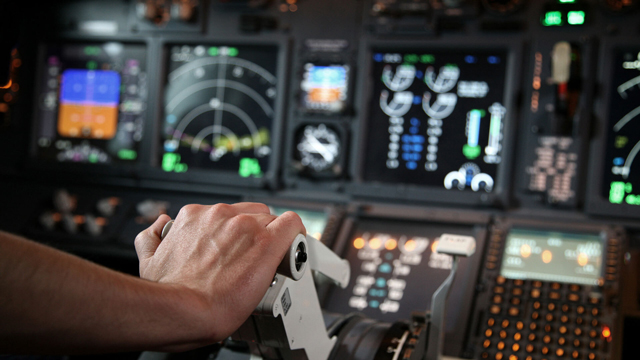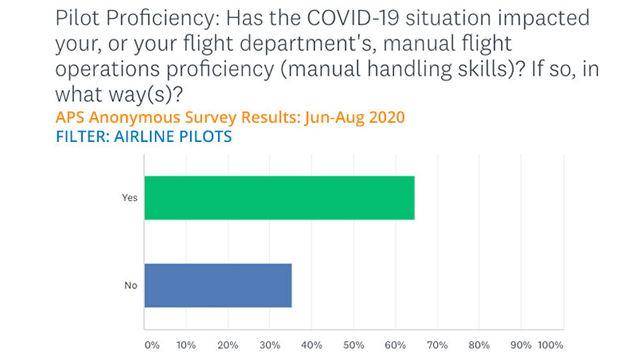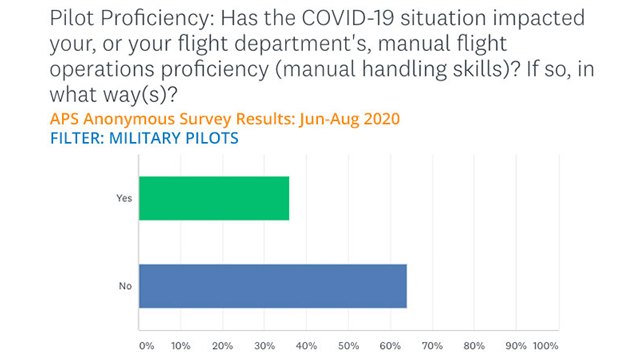Reduced Flying and Rusty Skills
The reduction in demand for travel and transportation brought on by the COVID-19 pandemic has resulted in the greatest reduction of flight hours in history. While the impact has varied greatly between different sectors of aviation (passengers vs. cargo, airlines vs. corporate, international vs. domestic), in many cases pilots have gone months without flying. You don’t need to be a pilot to understand the impact of this on manual flight operations proficiency. Like any other demanding skill, flying, especially in the manual domain, is a perishable skill from the standpoint of both physical and mental dexterity.

A New Report
While that alone should be of some concern, a recent report published by the International Air Transport Association (IATA) titled Aircraft Handling and Manual Flying Skills Report only increases the importance of this issue. This is especially true regarding the relationship between degraded manual flight operations proficiency related to Loss of Control In-flight (LOC-I).
The executive summary of the study, based on 5,650 respondents, holds this:
“…it was found that continuous use of automation does not strengthen pilots’ knowledge and skills in manual flight operations and in fact could lead to degradation of the pilot’s ability to quickly recover the aircraft from an undesired state.
Poor manual techniques are flagged by a number of accident analyses that cite inappropriate or erroneous control inputs by the flight crew in response to abnormal events. Although the overall Loss of Control In flight (LOC-I) accident rate has decreased, this accident category continues to outpace other factors as the leading cause of fatal accidents.”
Among the summary of survey results pertinent to this discussion were the following findings:
- Manual flying skills need to be trained and maintained, irrespective of the aircraft generation
- Manual flying skills can be lost if they are not practiced on a regular basis
- Pilots should be trained to revert to manual flying when automation fails or during an emergency
- Pilots need to maintain manual flying skills to a high degree of proficiency and must develop confidence in their ability to do so
Though only recently released, the survey questions were not related to reductions in flying due to Covid. In other words, if we had a problem before flight time was reduced, how much greater may it be today?
The FAA and Manual Flight Operations
Heightened awareness of Manual Flight Operations concerns began well before the reduction in flying. In January of 2013 the FAA issued a Safety Alert for Operators on the subject, SAFO 13002, based on the identification of an increase in manual handling errors. As though raising their voice to be heard, the FAA released a second SAFO in May of 2017, this time adding “Proficiency” after “Manual Flight Operations” in SAFO 17007 to try and make the point. In this second effort to get through to industry, the FAA called for some courses of action for improvement, among them were upset recovery maneuvers and stall prevention and recovery.
While their advice was directed at an air carrier’s training policies, it seems that it could be applied even more broadly: “All curricula should be designed in accordance with the philosophy that manual flight is the foundation upon which other technical flying skills are built. Therefore, the primacy of manual flight should be emphasized throughout all flight training syllabi, while recognizing that manual flight operations involve more than motor skills.”
APS Research on the Impact of COVID-19 on Manual Handling Proficiency
Research done by APS on pilots’ perception of the impact of reduced flying time due to the situation regarding COVID-19 confirm that many pilots consider degraded manual handling skills a significant problem. The graphs below show the results of a survey with over 150 respondents filtered by their aviation sector:



Over 50% of airline and corporate/executive pilots are concerned that reduced flying time has impacted their manual flight operations proficiency, and even 35% of military pilots are less confident in their proficiency as well. While these results reflect only pilot perception and do not measure actual deterioration of skills, the sentiment of these pilots is an important consideration.
Upset Prevention and Recovery Training (UPRT) to Fix the Problem
In order to explain how Upset Prevention and Recovery Training (UPRT) can assist in mitigating diminished manual flight operations proficiency that could result from decreased flying hours, we will revisit one of the IATA reports findings, that “pilots should be trained to revert to manual flying when automation fails or during an emergency.”
In Question 41from the study, the survey asked: Do you believe that training should put more emphasis on the unexpected transition from automatic flight to manual flying and vice versa? The reply had the most dominant answer of any question in the survey, with 91.9% of the pilots asked responding, “Yes”. This unexpected transition is precisely what occurs in an unexpected upset event, where the first action called for in most instances after recognizing and confirming the situation is to disconnect the automation.
The Disproportionate Benefit of UPRT
While pilots clearly see the need for training emphasizing manual handling and the immediate transition that can be necessary in an upset, the manual handling skills practiced in UPRT can have an even greater benefit. Because many of the skills and techniques required in an upset are counterintuitive to control inputs used in the normal flight envelope (in some cases exactly the opposite of what might be required in the normal domain), pilots without comprehensive training in upset situations may tend to do the wrong thing.
Right in General and Right for the Time
Increased manual operations proficiency and UPRT were beneficial before anyone had ever heard of Covid 19. The reduction in flying has only increased the benefits that accrue from the manual handling that arises from the in-flight practical skill development that UPRT brings.
Closing Quotes
We will end with two of the comments submitted by respondents to the IATA survey. They would always have been true, but are perhaps more so in today’s environment.
“The industry, for the sake of safety, should realize that pilots must keep their manual handling skills to a very good level and encourage this.”
“Please read all of my comments contained within this survey. I believe I have included many reasons that cause degraded manual flying skills. Once lost, they are very hard to get back when you are a part of a professional airline. It is hard to admit that you no longer have the level of proficiency required when you are a professional pilot. It is hard also for an operator to admit this. This should change.”




Comments: